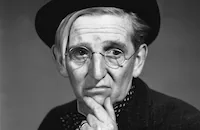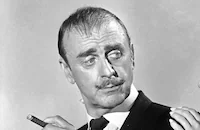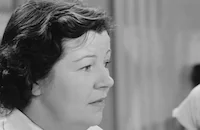Prejudice
Cast & Crew
Edward L. Cahn
David Bruce
Mary Marshall
Tommy Ivo
Bruce Edwards
Barbara Billingsley
Film Details
Technical Specs

Synopsis
Joe Hanson arrives in the town of Springville with his wife Beth and son Joey to take a new job his company has offered. They are pleased with the look of the community, and little Joey quickly makes friends with the little girl next door, Ellen Green. At the factory, Joe begins work as production manager, a position he feels is his first chance to do the kind of work he wants. His boss, J. P. Baker, praises him, saying he was picked because he knows how to handle machines and people. Ellen's father Al, who had temporarily filled in as production manager before Joe arrived, now becomes his assistant. The two men drive home together, and when a black man's stalled car blocks the way, they hear an irate white man complain, "These niggers shouldn't be allowed to drive cars." Joe tells Al he "doesn't go for that sort of thing," after which Al reveals that he is Jewish and often faces prejudice himself. Joe confides that he is a Scandinavian Protestant, and Al's religion makes no difference to him. At home, Joe reveals to Beth that the Greens are Jewish and cautions her not to make any "slips." When Joey asks, "What's wrong with Jews?," Joe replies they are exactly like other people. At the Green home, Al tells his wife Doris about the incident and says that the Hansons look like nice people. Doris chidingly asks, "Even though they are Gentiles?" and they laugh. After pamphlets are distributed in town condemning Jews, blacks and foreigners as menaces to America, the minister at the Hansons' church delivers a sermon about prejudice, calling it a disease, and asks his congregation to search their hearts so that they can face their feelings of prejudice and replace them with brotherhood and love. Following the service, the minister is troubled when Beth and Joe say that Joey must be careful about what he says around others. Although Joe and Al seemingly work well together, Joe begins to get suspicious that Al may be trying for his job when Al fills in for him at a meeting because he is late. One evening, as the minister is visiting, Joey comes home after having been in a fight and complains about the "dirty wops" on their block. Embarrassed, Joe tells the minister that his son must have picked up his feelings of hate from other children, but the minister questions Joe about his own bigotry. Joe remembers incidents from his childhood: Although he became friends with children named "Ike," "Mike" and "Ole," whose last names he could not pronounce, his parents complained about "queer" foreigners crowding in and competing for jobs, and stated that the "white man" is better. Soon he stopped playing with those other children. He also remembers one of his mother's friends asserting, "I don't call any nigger 'Mrs.'" Joe recalls asking the teacher in a religious class if Jesus loves Negroes, and though his teacher said Jesus loves everyone, he felt she was holding something back. He next remembers that when he wanted a bicycle one summer and planned to get a job at a Jewish shopkeeper's store to earn enough money, the shopkeeper ultimately gave the job to a Jewish boy. Joe then remembers the first time he felt prejudice: During a football game after school, Joe fumbles the ball following a tackle. When another boy says that a "dirty Jew" unfairly tackled him, Joe agrees, pleased that the fumble was not his fault at all. The minister now explains that the basis for all prejudice is scapegoating, which stems from insecurity. At work, Joe soon suspects that Al is aggressively courting the boss's favor and says nothing when a colleague comments, "They're all alike; give them an inch and they take a mile." When Baker asks Joe about Al's performance, as his trial period is coming to an end, Joe, under great stress from overwork because he refuses to let Al help him, praises Al, but confides that some people do not like to work with a Jew. Worried that such conflicts can ruin an organization, Baker transfers Al to another office. Al is downcast about the situation, but tells Joe that if everyone were as straight as he has been, this would not have happened. At home, however, Al angrily tells Doris that "they" make it a crime to be born Jewish and expresses his exasperation over having to move again because someone complained. When Doris conveys the hope that Ellen will not have to face the same prejudices, Al cynically says that things will never be different. Meanwhile, Baker, suspecting that Joe is afraid to have good men working under him, tells the curious minister that Joe lacks confidence. On Sunday, the minister gives another sermon about prejudice, reaffirming that fearful and insecure people attempt to alleviate their suffering through blaming others for their misfortunes. He concludes that people who are prejudiced have no faith in God or themselves and that the key to eradicating prejudice is the acceptance of God's love and grace, which brings dignity, security and strength. The next day, when Joe drives Ellen and Joey to school, the children say in unison, "Ellen is a Jew." She cries, then runs off, and Joey, who earlier had been called a "dumb Swede" by some of the children, follows. Joe drives past the church, remembering the minister's promise that confidence and dignity will be gained if one accepts God, then goes to the factory to meet with Baker.

Director
Edward L. Cahn
Cast
David Bruce
Mary Marshall
Tommy Ivo
Bruce Edwards
Barbara Billingsley
James Seay

Joe Crehan
Billy Kimbley

Jimmy Conlin
Sharon Mcmanus

Anne Nagel
Frank Cady
Mira Mckinney
Grace Field
Ruth Clifford
Kay Christopher

John Dehner
Buddy Swan

Margaret Bert
Belle Mitchell
Clarence Hennecke
Crew
Phil Cahn
Mario Castegnaro
Albert Conti
Jarvis Couillard
Lewis H. Creber
Edmund L. Dorfmann
Irving Gertz
Bert Glazer
Ivan Goff
Garry Harris
Paul F. Heard
Harry Reif
Ben Roberts
Jackson Rose
Elbert Spurlin

Film Details
Technical Specs

Quotes
Trivia
Notes
Actress Anne Nagel's surname is incorrectly spelled "Nagle" in the onscreen credits. According to Look, the Protestant Film Commission, which represented nineteen major denominations and thirteen interdenominational agencies, was formed in the mid-1940s "as part of the Churches' effort to use mass media of communication to promote Christian living." Prints of the film, which was the Protestant Film Commission's first to be exhibited theatrically, were sold outright. The film also had a non-theatrical release, opening in 100 churches in the U.S. and Canada on October 18, 1949, according to Hollywood Reporter. The film showed at Town Hall in New York and in London. The Protestant Film Commission planned twelve pictures for the next two years dealing with Japan's internal struggle, alcoholism, mental health, marital incompatibility and adjusting to bereavement, according to Look. Although Variety notes that New World Films and producer Edmund L. Dorfmann were connected to the film, and the 1950 Film Daily Year Book lists the film as a New World release, the company was most likely involved only in the state rights distribution of the film.
Variety criticized this film, stating it "suffers from punching too hard, too directly and too repetitiously. The story elements are developed without plausibility, serving only as an obvious peg for several long sermons which are used as a substitute for dramatic situations. General production values also suffer paradoxically from a slickness which lessens the impression of sincerity." Daily Variety predicted that the film "will prove acceptable fare in churches, clubs, schools, etc. When it comes to selling it to theatres, however, distributors will likely bump into the answer 'another film which tries to capitalize on intolerance.'"












